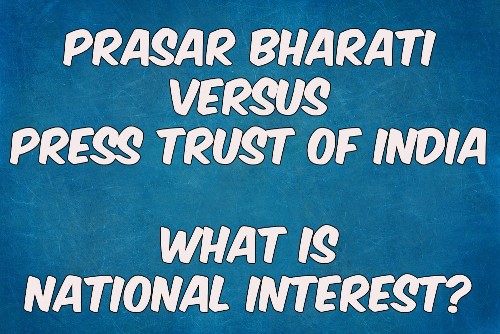

By Sunil Garodia
First publised on 2020-06-29 13:21:43
Prasar Bharati, the state-run broadcasting agency that controls All India Radio and Doordarshan, has threatened to stop subscribing to the news feeds from Press Trust of India as it is allegedly publishing news that is not in the national interest.
What is national interest? Is it a synonym of "ruling-party interest"? Who defines it, and how?
The trigger for Prasar Bharati's threat was perhaps the interview PTI conducted with the Indian envoy to China Vikram Misri where the ambassador is quoted as making statements that ran counter to the government's stated response that there was no intrusion by China.
In the first tweet, PTI wrote that "India hopes China will realize its responsibility in de-escalation and disengaging by moving back to its side of LAC: Indian envoy to China". In the second tweet, it wrote that "China has to stop the practice of transgressing and trying to erect structures on the Indian side of the LAC: Indian envoy to China".
The statements made by envoy Vikram Misri in his interview were in direct contrast to the position taken by Prime Minister Modi in his interaction with state chief ministers when he had categorically said that no one had intruded into Indian territory.
But what was PTI's fault? Has it put words in the mouth of the envoy? Or has it published false statements? Neither the envoy nor the government has denied the statements. If at all anyone is at 'fault' then it is the envoy as he should have been briefed not to say anything that ran counter to the stated position of the government. But can the envoy speak untruths or hide facts just to please the government? Will that be in national interest?
This is where the real meaning of national interest comes in. National interest is best served by people in power making truthful disclosures of all that is happening in the country, except perhaps things that might put the security of the nation at risk. If China had intruded and if it was given to erecting structures in Indian-held areas, these facts needed to be in the public domain. The envoy was acting in national interest by disclosing the facts. PTI was also acting in national interest by publishing what he said. But Prasar Bharati is not acting in national interest by threatening to stop subscribing to the news feed of PTI.
It is a weak and absurd plea that disclosing that China had intruded into Indian territory would have lowered the morale of the armed forces or reduced India's bargaining power. In fact, with satellite pictures showing how far inside the Chinese had come in and how they were building structures in areas that were not theirs, India should not and could not have hidden the actual position from anyone. The morale of the armed forces would have been boosted enormously if the government had forcefully said that the Chinese had intruded and we have to make them leave through negotiations, failing which we will have to throw them out. That statement would have definitely been in national interest.











